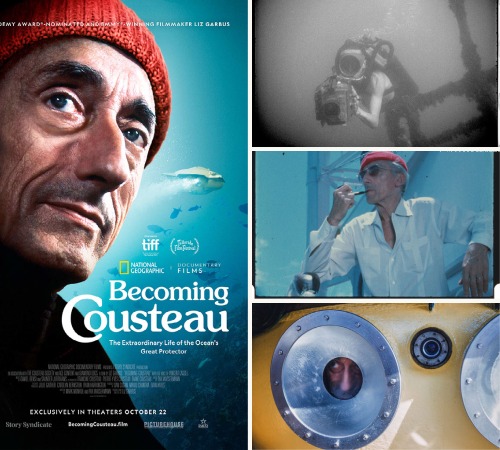 BECOMING COUSTEAU, US, 2021 (Documentary). Directed by Liz Garbus. 93 minutes. No rating yet available.
BECOMING COUSTEAU, US, 2021 (Documentary). Directed by Liz Garbus. 93 minutes. No rating yet available.
Before his death in 1997 at the age of 80, French diver, Jacques-Yves Cousteau, was an international figure, honoured by national leaders around the world. This documentary traces his career as a diver, his contribution to science and innovation, especially the aqualung (leading to scuba developments), his expeditions, his films and television series, his growing realisation about the destruction of the oceans, and his career as an environmental crusader.
This film, made for National Geographic, obviously has that audience strongly in mind. That is, an audience who appreciates films about the wonders of nature, especially underwater life, but also audiences who are committed to the preservation of world heritage. It is not a biography of Cousteau, although there are some personal elements of his life throughout the film. For those who want a feature film version of his life, see the French film, The Odyssey (2016), which stars Lambert Wilson as Cousteau, Audrey Tautou as his wife, Simone, and Pierre Niney as his son, Philippe. (Although some aspects of Cousteau’s personal life, especially his second family and his second wife are alluded to in The Odyssey they are made explicit in Becoming Cousteau.) The director of Becoming Cousteau, Liz Garbus, has a strong and long list of documentary achievements, including documentaries about Marilyn Monroe (Love, Marilyn), Gloria Vanderbilt (Nothing Left Unsaid: Gloria Vanderbilt & Anderson Cooper), and Nina Simone (What Happened, Miss Simone?).
There are many scenes of Jacque-Yves working with his son Philippe, who was lead cinematographer for most of the Cousteau films until his untimely death in 1979 at the age of 38 when his flying boat crashed in the Tagus river near Lisbon.
Jacque-Yves Cousteau is a genial screen presence. There are many interviews, television appearances, addresses to international organisations. The filmmakers have the advantage of the Cousteau archives, a range of photographs starting with his childhood, a great range of home video material, and excerpts from his films and documentaries. They give a round picture of Cousteau and his achievements.
The film pays tribute to his early life, an accident and having to swim to overcome it, his exhilaration in the discoveries of diving, his work in the Navy – and his forever afterwards being referred to as Captain Cousteau, his development of the aqualung during the 1940s (the film not mentioning his work in the Resistance), the collaboration with friends enabling divers to spend longer times underwater and go deeper. He wrote a book, The Silent World, 1954, filmed and Oscar-winning in 1956. This began a long career of film and television making, awards, popularity in the US, and beyond.
However, Cousteau went through something of a conversion experience. Early film shows some brutality in landing sharks and battering them. Cousteau and his team, with his re-conditioned boat, Calypso, were invited to help in the underwater search for oil. Cousteau says in the 1970s that he watched The Silent World again and repudiated much that was in it. He then became an international crusader for the preservation of the oceans, showing sequences of coral reef devastation (an alert to Australians about the Great Barrier Reef), contamination, pollution, refuse and garbage in the sea.
He was the leading speaker at the United Nations Conference in Rio de Janeiro in 1992, gaining pledges of countries around the world (including glimpses of an affable Fidel Castro), and the development of his Cousteau Foundation.
Cousteau’s long life was completely in the 20th century – but his work and inspiration are more relevant than ever in the 21st-century.
Rialto
Released 14 October